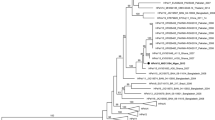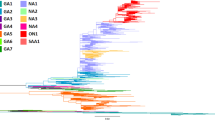Abstract
Mayor and Melnick1 have recently presented data on a group of small single stranded DNA viruses which cannot confidently be placed in any recognized virus group, and they tentatively propose a group designation of picodna-viruses for these viruses. Present work on feline panleucopaenia (FP) virus strains has resulted in findings which suggest a possible classification of such strains in this grouping.
This is a preview of subscription content, access via your institution
Access options
Subscribe to this journal
Receive 51 print issues and online access
$199.00 per year
only $3.90 per issue
Buy this article
- Purchase on Springer Link
- Instant access to full article PDF
Prices may be subject to local taxes which are calculated during checkout
Similar content being viewed by others
References
Mayor, H. D., and Melnick, J. L., Nature, 210, 331 (1966).
Johnson, R. H., Vet. Rec., 76, 1008 (1964).
Johnson, R. H., Nature, 205, 107 (1965).
Johnson, R. H., Res. Vet. Sci., 6, 466 (1965).
Johnson, R. H., Res. Vet. Sci., 6, 472 (1965).
Johnson, R. H., Res. Vet. Sci., 7, 112 (1966).
Johnson, R. H. (in the press)..
Author information
Authors and Affiliations
Rights and permissions
About this article
Cite this article
JOHNSON, R., CRUICKSHANE, J. Problems in Classification of Feline Panleucopaenia Virus. Nature 212, 622–623 (1966). https://doi.org/10.1038/212622a0
Published:
Issue Date:
DOI: https://doi.org/10.1038/212622a0
This article is cited by
-
Growth of an autonomously replicating parvovirus (feline panleukopenia): Kinetics and morphogenesis
Archives of Virology (1978)
-
Characteristics of feline panleucopaenia virus strains enabling definitive classification as parvoviruses
Archiv f�r die gesamte Virusforschung (1974)
-
Some properties of feline panleukopenia virus
Archiv f�r die gesamte Virusforschung (1973)
-
Parvoviruses as contaminants of permanent human cell lines
Archiv f�r die gesamte Virusforschung (1971)
-
Identity of Feline Ataxia Virus with Feline Panleucopenia Virus
Nature (1967)
Comments
By submitting a comment you agree to abide by our Terms and Community Guidelines. If you find something abusive or that does not comply with our terms or guidelines please flag it as inappropriate.



